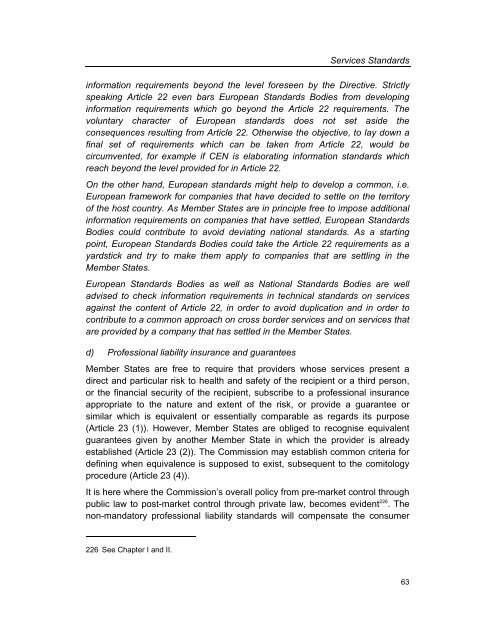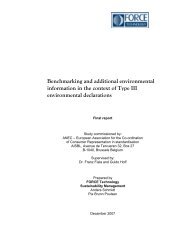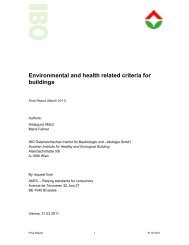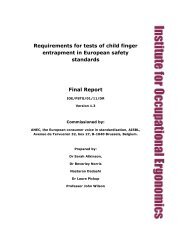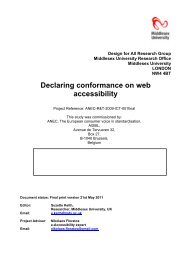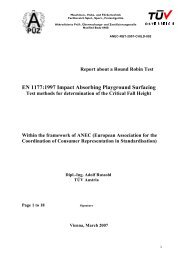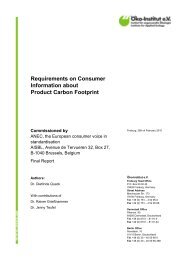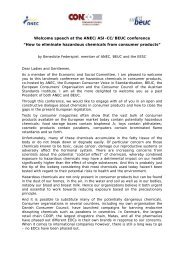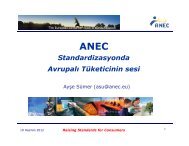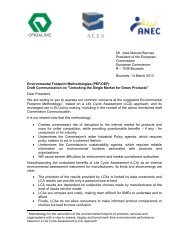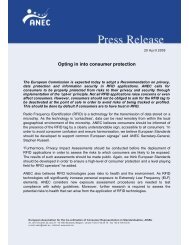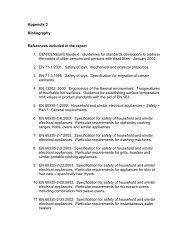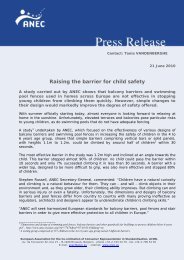Services Standards: Defining the Core Consumer Elements ... - ANEC
Services Standards: Defining the Core Consumer Elements ... - ANEC
Services Standards: Defining the Core Consumer Elements ... - ANEC
You also want an ePaper? Increase the reach of your titles
YUMPU automatically turns print PDFs into web optimized ePapers that Google loves.
<strong>Services</strong> <strong>Standards</strong><br />
information requirements beyond <strong>the</strong> level foreseen by <strong>the</strong> Directive. Strictly<br />
speaking Article 22 even bars European <strong>Standards</strong> Bodies from developing<br />
information requirements which go beyond <strong>the</strong> Article 22 requirements. The<br />
voluntary character of European standards does not set aside <strong>the</strong><br />
consequences resulting from Article 22. O<strong>the</strong>rwise <strong>the</strong> objective, to lay down a<br />
final set of requirements which can be taken from Article 22, would be<br />
circumvented, for example if CEN is elaborating information standards which<br />
reach beyond <strong>the</strong> level provided for in Article 22.<br />
On <strong>the</strong> o<strong>the</strong>r hand, European standards might help to develop a common, i.e.<br />
European framework for companies that have decided to settle on <strong>the</strong> territory<br />
of <strong>the</strong> host country. As Member States are in principle free to impose additional<br />
information requirements on companies that have settled, European <strong>Standards</strong><br />
Bodies could contribute to avoid deviating national standards. As a starting<br />
point, European <strong>Standards</strong> Bodies could take <strong>the</strong> Article 22 requirements as a<br />
yardstick and try to make <strong>the</strong>m apply to companies that are settling in <strong>the</strong><br />
Member States.<br />
European <strong>Standards</strong> Bodies as well as National <strong>Standards</strong> Bodies are well<br />
advised to check information requirements in technical standards on services<br />
against <strong>the</strong> content of Article 22, in order to avoid duplication and in order to<br />
contribute to a common approach on cross border services and on services that<br />
are provided by a company that has settled in <strong>the</strong> Member States.<br />
d) Professional liability insurance and guarantees<br />
Member States are free to require that providers whose services present a<br />
direct and particular risk to health and safety of <strong>the</strong> recipient or a third person,<br />
or <strong>the</strong> financial security of <strong>the</strong> recipient, subscribe to a professional insurance<br />
appropriate to <strong>the</strong> nature and extent of <strong>the</strong> risk, or provide a guarantee or<br />
similar which is equivalent or essentially comparable as regards its purpose<br />
(Article 23 (1)). However, Member States are obliged to recognise equivalent<br />
guarantees given by ano<strong>the</strong>r Member State in which <strong>the</strong> provider is already<br />
established (Article 23 (2)). The Commission may establish common criteria for<br />
defining when equivalence is supposed to exist, subsequent to <strong>the</strong> comitology<br />
procedure (Article 23 (4)).<br />
It is here where <strong>the</strong> Commission’s overall policy from pre-market control through<br />
public law to post-market control through private law, becomes evident 226 . The<br />
non-mandatory professional liability standards will compensate <strong>the</strong> consumer<br />
226 See Chapter I and II.<br />
63


